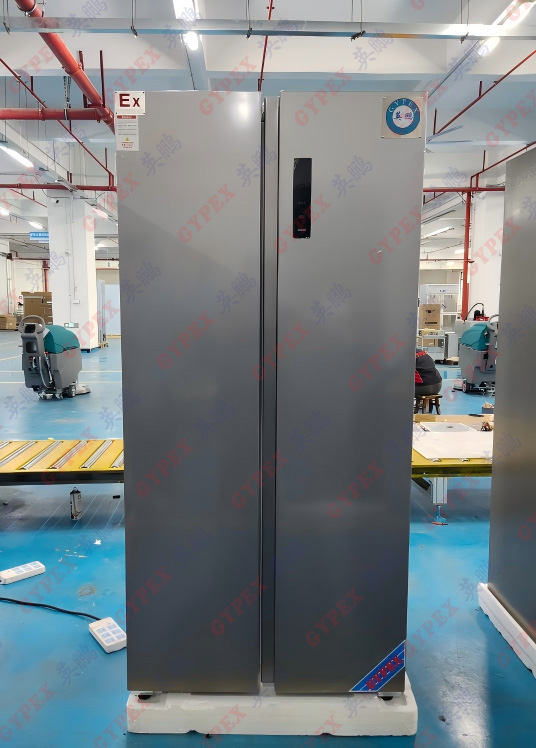Understand the performance characteristics of the direct cooling and air-cooled models of the Yingpeng explosion-proof refrigerator
2025-09-11 09:22:59
450
行业新闻
In fields involving the storage of flammable and explosive materials, such as chemical, laboratory, pharmaceutical and other industries, explosion-proof refrigerators are key equipment to ensure safety. Among them, direct cooling and air-cooled are two common types, each with its own characteristics in terms of performance. Now, let's delve deeper into it together.

1、 Refrigeration principle
The evaporator cooling pipe of the direct cooling explosion-proof refrigerator is directly attached to the inside or back of the refrigeration and freezing compartments. During work, the air near the cooling pipe rapidly cools down, forming natural convection inside the refrigerator to lower the temperature of items. The air-cooled explosion-proof refrigerator generates cold air through a built-in hidden evaporator, and uses a fan to force the cold air circulation, so that the cold air is evenly distributed in each compartment of the refrigerator.
2、 Advantages and disadvantages overview
Direct cooling type
Advantages: The structure is relatively simple, which reduces the failure rate and makes maintenance easier. Due to natural convection in a closed space and high air humidity, the moisture content of items is not easily lost, which is advantageous for storing hazardous chemicals or biological samples that are sensitive to humidity and relatively energy-efficient.
Disadvantages: It is prone to frosting and requires users to manually defrost. If not treated in a timely manner, the frost layer will affect the evaporator's heat absorption and cooling, reduce cooling efficiency, and cause uneven distribution of cooling capacity in the refrigerator, resulting in frozen dead corners and varying degrees of food freezing. Moreover, high air humidity may cause items in the freezer to stick together and items in the refrigerator to become damp and greasy.
air-cooled
Advantages: Automatic defrosting function, no manual operation required, worry free and labor-saving, effectively avoiding the impact of frosting on refrigeration. At the same time, air cooling makes the cooling speed faster, temperature control more precise, and the temperature uniformity inside the refrigerator better.
Disadvantages: The complex structure results in a relatively high failure rate, and the continuous operation of the fan and automatic defrosting function increase energy consumption, making it more power consuming compared to direct cooling. Moreover, fans cause frequent flow of cold air and high wind speed, which can easily lead to the evaporation of moisture in items. This poses a certain risk for the storage of hazardous chemicals that are prone to volatilization and require high humidity. In addition, fan operation can also generate certain noise.
3、 Applicable scenarios
If the stored items require extremely high humidity and the budget is limited, and can accept regular manual defrosting, then a direct cooling explosion-proof refrigerator is a good choice. For example, in some small laboratories, direct cooling refrigerators can better meet the demand for storing small amounts of humidity sensitive chemical reagents. If the storage requirements for temperature uniformity are strict and the frequency of use is high, and one does not want to frequently deal with frost problems, an air-cooled explosion-proof refrigerator will be more suitable. Like the raw material storage areas of large chemical enterprises, air-cooled refrigerators can ensure that a large number of items are stored in a stable low-temperature environment.